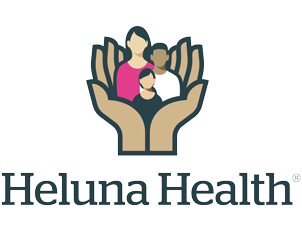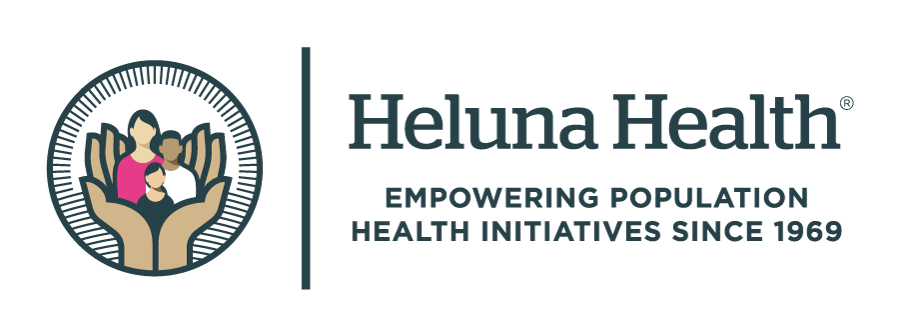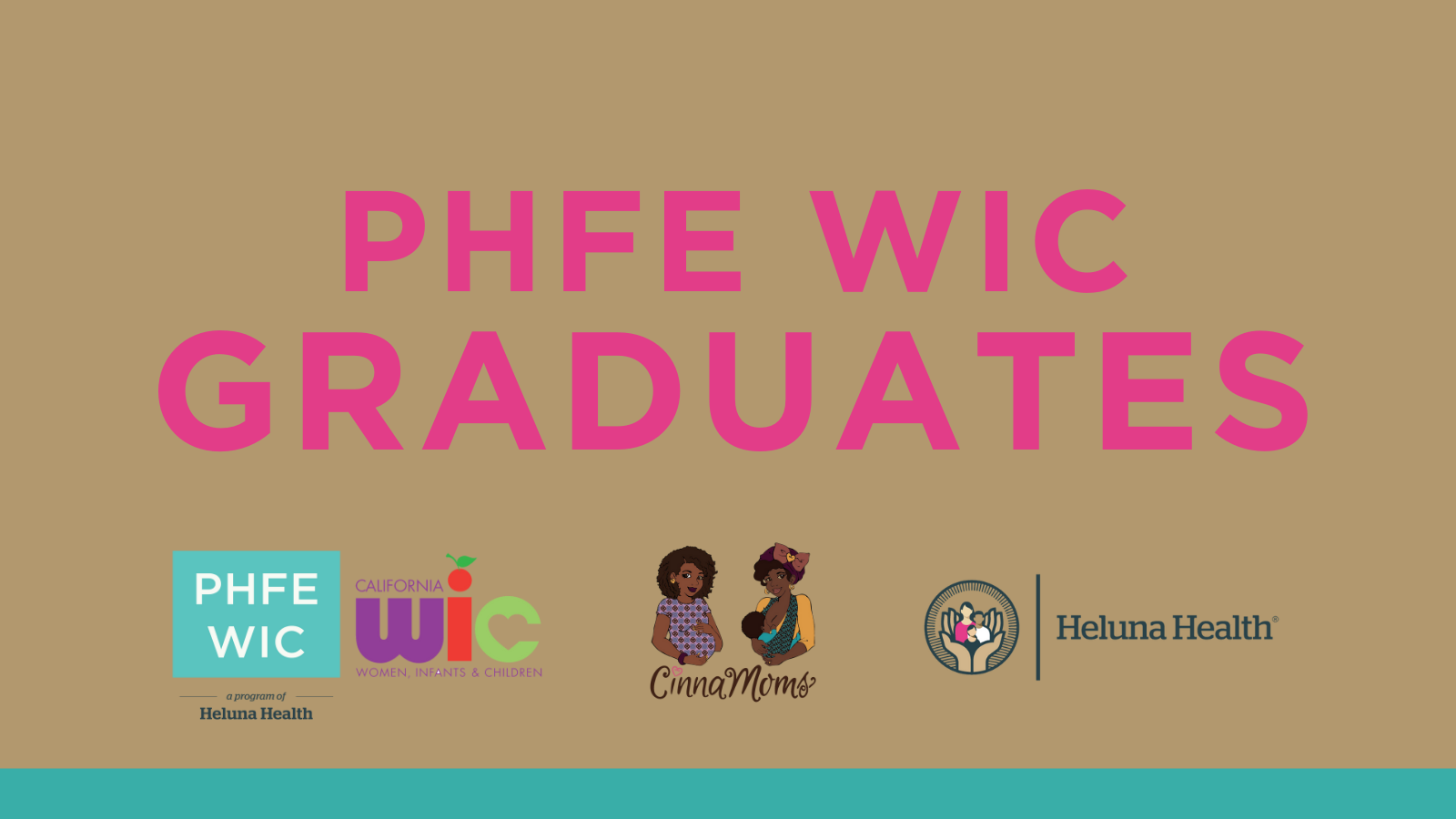PHFE WIC, a program of Heluna Health, has served mothers, pregnant and postpartum people, infants, children, and caregivers for more than 40 years, providing healthy free food, nutrition education, breastfeeding support, and family resources to more than 180,000 participants each month. That long legacy of good work has produced hundreds of thousands of “WIC graduates” – an insider term for former participants of WIC.
“Graduating” from WIC means that you were in need and received the supplemental services available to you through USDA funding at some point in life and have grown to no longer need this support. The WIC program is reserved for pregnant, breastfeeding, and postpartum women, infants, and children under age five who have a low income (up to 185% of the federal poverty level) and are at nutritional risk. WIC is an integral part of parents’ support systems as they grow their families. In 2018, 54% of infants born in California participated in WIC.
Many WIC graduates pay it forward and work for WIC later in life, bringing empathy and cultural competence from their lived experiences to their professional roles. Working at WIC is no small feat. The PHFE WIC Program, with 40+ centers in Southern California, is a nationally recognized leader and innovator in nutrition education, breastfeeding support, staff training, customer service, and outreach to community partners. Most positions within the program require degrees or certifications. WIC employs hundreds of Registered Dietitian Nutritionists, Lactation Consultants, and Certified Lactation Educators, and all roles make a direct and positive impact on the community. We interviewed five WIC graduates who now work at PHFE WIC to learn how WIC has impacted their lives and how they’re paying it forward.
How did WIC impact your life when you were a WIC participant?
“It made a huge difference. Both of my parents were working full time to support their family of seven children. We all had WIC as kids. That’s how much my parents needed WIC services.”
What stories have you been impacted by most since you’ve started working with WIC families?
“Every WIC family has a story or background to tell. When I hear families are not working or receiving financial assistance, when I hear families are living off savings trying to find a job, not sure if they can pay rent–it’s tough. I think about what I can do at that moment to try to make a difference. I think about offering and sending resources and referrals so they can be successful in their life journey.”
How did WIC impact your life when you were a WIC participant?
“WIC helped provide my mom with formula and supplemental foods so I could grow and be healthy. Unfortunately, I was never breastfed, but my mom had WIC to help with everything else. She raised me as a single mother so that support, especially the first year of my life, was essential.”
What accomplishment are you most proud of from your work at PHFE WIC?
“My promotion to CinnaMoms Project Coordinator has been a pretty big deal to me. I have the opportunity to continue to do nutrition research with PHFE WIC through our Innovation Grant. I manage it alongside Dr. Toncé Jackson, Senior Health Equity Manager, to hit our grant deliverables of an improved WIC experience for Black families, targeted outreach, and the evaluation of CinnaMoms as an evidence-based model.”
How did WIC impact your life when you were a WIC participant?
“I was a teen mom and did not have much support from my family, so WIC was instrumental to my pregnancy. WIC provided information on healthy eating during my pregnancy, and once I had my baby, they taught me how to feed my baby appropriately. I really appreciated all the help I received from WIC, and the staff always treated me with respect. They encouraged me to ask questions and provided me with handouts to read at home and share with family. WIC enabled me to become an assertive teen parent and to make better eating choices for my children and myself.”
What stories have you been impacted by most since you’ve started working with WIC families?
“As WIC employees, we come across many families that are going through hard times. They need resources, referrals, guidance, and compassion. On one occasion, I served a family that was very concerned with their child’s nutrition, development, and behavior. I was able to provide the mom with handouts on nutrition and her child’s development from our Little By Little School Readiness Program. The participant was able to use these tools to request a referral from her doctor for further evaluation. It was because of these tools that the mother was empowered to start a conversation with her doctor. Getting her child early intervention allowed them to have better opportunities to succeed in the future.”
How did WIC impact your life when you were a WIC participant?
“My mom received WIC for both my older sister and me. We have had financial hardships where our electricity and water were shut off because my parents had to choose between paying rent or paying utilities. My mom mentioned that WIC has helped her understand the importance of healthy eating, breastfeeding, and immunizations; especially immunizations. ‘Til this day, she is grateful.”
How has being a former WIC participant influenced your approach to your work at WIC?
“Having to experience food insecurity firsthand has given me the lens to look through a participant’s eyes. Of course, I will never understand exactly what every participant is going through, but having that experience has helped me have a conversation with a participant about their day, whether it be good or bad. WIC may be the only source of support to some participants, and I love being that person that can relate as I am a mom to a 4-year-old and former WIC participant.”
How did WIC impact your life when you were a WIC participant?
“My mom actually participated in the WIC program when I was born, but I did not know I was a WIC participant until I applied for an internship at WIC. It took some time for [my mother] to reveal that she had participated in the program [because she was not a citizen at the time and was scared that the help she had received might affect her getting residency]. We were able to get a lot of nutrition resources.”
“I was a teen mom, and I became pregnant at 18. I felt like I was a person who was really lost. I had all these question marks. I just didn’t know what to do with myself. I participated in the WIC program for about six months or so when I was not working. They had a teen program, and through that teen program, they were encouraging a lot of their participants to pursue schooling, on top of the information they gave about healthy foods for my family.”
What inspired you to work for PHFE WIC?
“When I was a WIC participant as a teen mom, I thought ‘I would really like to work for a program, such as this, that provides this information to families.’ I went back to school, and started off as a computer science major and then after working as a food service worker at a hospital, my goal was to get a degree in nutrition, so I think learning from the WIC program really inspired my career.”
People who have received WIC as children are extremely valuable WIC employees. Their cultural competence and empathy that come from their lived experiences help them listen and connect with families in the community during the most vulnerable time of that person’s life. This ability to empathize and connect is what makes WIC graduates paying it forward and the WIC program in general an important part of the support system for over half of all infants born in California (49% of infants born in the US in 2018). While WIC functions to support qualifying families during their time of need, the support they receive has proven to foster life-improving outcomes for years to come.
If you would like to support PHFE WIC’s mission and help support the next generation of WIC graduates, consider donating to this life-changing program.





